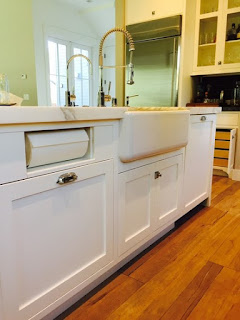Mix and Match Kitchen Materials for a Knockout Design
by Yanic Simard
Give your kitchen
unexpected flavor by combining wood,
stone, glass and more. Here’s how to get the mix right
stone, glass and more. Here’s how to get the mix right
The kitchen is all about mixing and matching.
Experienced chefs often love to break away from that ho-hum recipe mold and
create something new with a dash of unexpected flavor. Achieving this in your
kitchen design is possible in many ways. Here are some of my best tips for
combining materials to create a unique kitchen look that suits your individual
taste.
Countertops
I’m a huge fan of using a statement material for the island and a simpler surface for countertops, like in this recent client project in which two different quartz stones from Cambria on the island and counter are mixed. And don’t hesitate to contrast quartz against marble, granite or other stones.
I’m a huge fan of using a statement material for the island and a simpler surface for countertops, like in this recent client project in which two different quartz stones from Cambria on the island and counter are mixed. And don’t hesitate to contrast quartz against marble, granite or other stones.
The key to mixing surfaces
is to use tones that relate (by sticking to either cool or warm families) and
also to use strong contrast so the mismatch is clearly intentional and
beautiful. Pick a material with a grain or variation, and then use one of the
grain tones for the solid surface. Here the dark zinc on the islands matches
the grain tone of the polished Calacatta gold marble.
These material combinations are often applied
to white kitchens. The white keeps the mix from looking too wild, yet the
contrast gives the minimalist palette extra life. Here we see what I believe is
a light Statuario marble island and darker Emperador marble counters.
Continuing a material theme with other
surfaces helps tie everything together, such as using a marble-topped dining
table (like the classic Saarinen style seen here) to pick up on a marble
counter and backsplash.
You can also beautifully mix stone counters
with butcher block. Take a cue from this room and use a demure, subtly
patterned stone to avoid its fighting your wood grain.
Upper and Lower Cabinets
Another great way to mix in wood is to use a little on the lower cabinets (matching or lighter than the floor), and stick to the wall color on the uppers for a rich natural flair mixed with airiness.
Another great way to mix in wood is to use a little on the lower cabinets (matching or lighter than the floor), and stick to the wall color on the uppers for a rich natural flair mixed with airiness.
Dark gray or a punchy color also works well on
lower cabinets (with light uppers) to keep the eye moving without the feeling
being claustrophobic.
For more drama, apply a dark color to the
uppers instead, but stick to neutrals. A calm gray like this won’t crowd you in
as much as a very saturated color — save that for a few small accents.
You can also try breaking up dark cabinets
with glass door fronts to reduce the dark surface area.
Darker cabinets work well to frame the kitchen
for a modern look, because they visually define where the kitchen starts and
ends even if your floor plan is open.
For a traditional look, apply a dark finish to
the island so it stands out from the main cabinets as its own furniture
statement.
Mixed-Metals Magic
In modern and traditional spaces, copper is one of the hottest finishes of the year; it works best in small doses, like on a few pendants or hanging pots.
In modern and traditional spaces, copper is one of the hottest finishes of the year; it works best in small doses, like on a few pendants or hanging pots.
In general you shouldn’t be afraid to mix in a
touch of a new, warm metal, like the brass pendants seen here, to add decadent
contrast to stainless steel appliances or accents.
Matte black gunmetal also works wonders as a
stunning counterpoint to shiny stainless steel.
 Keep in mind, when mixing many materials and
tones, it’s best to pick some themes to repeat to create a sense of harmony,
such as using multiple shades of wood or sticking to only neutrals. When in
doubt, wood, metal and glass make a classic trio.
Keep in mind, when mixing many materials and
tones, it’s best to pick some themes to repeat to create a sense of harmony,
such as using multiple shades of wood or sticking to only neutrals. When in
doubt, wood, metal and glass make a classic trio.
One Last Idea
In this project, wallpaper was used in the dining space as a kitchen backsplash, layered under a glass panel. This unusual use of material connects the adjacent spaces and makes a unique statement that stands up to passing trends.
As long as you combine materials you love in a way that feels right to you, you’ll achieve a look you’ll love beyond the passing of trends. So go ahead and mix with confidence!
In this project, wallpaper was used in the dining space as a kitchen backsplash, layered under a glass panel. This unusual use of material connects the adjacent spaces and makes a unique statement that stands up to passing trends.
As long as you combine materials you love in a way that feels right to you, you’ll achieve a look you’ll love beyond the passing of trends. So go ahead and mix with confidence!

















Comments
Post a Comment